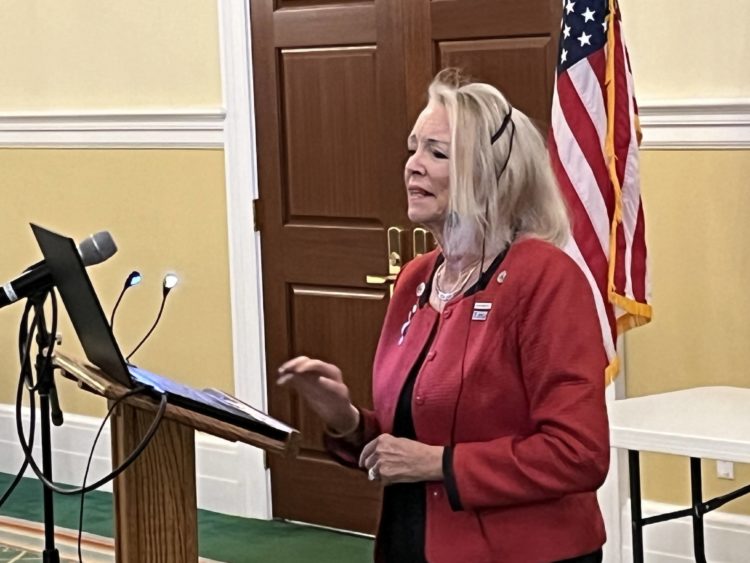
By Michael Abraham
At the October 30th meeting of the Retired Men’s Association, Bob Rimmer introduced the week’s speaker, Carleen Lyden Walker. Her talk was titled “ZERO POINT FOUR: The Critical Role and Vulnerabilities of U.S. Maritime to our National Security,” and was based on her recent book on the topic. She explained how a lack of maritime preparedness creates vulnerabilities to our national economy, through energy, food, climate, workforce and military readiness and flexibility.
Rimmer’s introduction highlighted Walker’s impressive credentials, including her status as one of the top 100 women globally with maritime expertise, her role as founder and CEO of multiple maritime-related organizations, and her numerous awards and commendations from the U.S. Coast Guard and other maritime bodies.
Walker began her presentation by sharing her personal connection to the maritime industry. She grew up on an island in Michigan, near where the Detroit River meets Lake Erie. As a teenager, she found solace in watching ships navigate the Detroit River, which was then the second busiest waterway in the world after the Suez Canal. This early fascination led her to pursue a career in the maritime industry after initially working in advertising in New York City.
She then delved into the current state of the U.S. maritime industry, highlighting a stark contrast between the past and present. After World War II, over half of the world’s ocean-going commercial ships flew the U.S. flag. However, today that number has dwindled to less than 0.4% – a mere 180 out of 55,000 globally traded cargo ships. This dramatic decline served as a central theme throughout Walker’s presentation, emphasizing the vulnerabilities it creates in various sectors including energy, food, climate, workforce, and military readiness.
Walker stressed the importance of the maritime industry, noting that more than 90% of the world’s goods and energy are transported by ships. She described shipping as the backbone of a nation’s economy and security, as well as the most environmentally and economically efficient mode of transporting bulk goods. The speaker also emphasized the vital role shipping plays in supporting military efforts. To illustrate the relationship between a nation’s prosperity and its maritime heritage, Walker provided historical examples. She mentioned Portugal and Spain, once great maritime powers in the 15th and 16th centuries, and Great Britain, known for its naval dominance, questioning their current global maritime status. She also touched on China’s maritime history, noting its power until 1421 and its recent resurgence in the past 30-40 years.
The presentation then shifted to the current state of the international maritime world. Walker described an industry in transition, facing pressures to become more transparent due to regulations and societal demands. She highlighted several challenges, including a significant seafarer shortage, embattled seaways such as the Red Sea and South China Sea, and the rise of the “dark fleet” – ships carrying sanctioned oil that evade detection by turning off their automatic identification systems.
Walker also discussed the globalized nature of shipping, with transnational ownership, open registries, and multinational crews. She noted the industry’s increasing dependence on technology, including satellite communications, GPS, and the potential for automation and AI integration. She addressed the impact of the maritime industry on supply chains, referencing the recent crisis during the COVID-19 pandemic when 126 ships were stuck off the coast of Los Angeles and Long Beach. She clarified that the problem was not with the ships themselves but with the lack of personnel to discharge and move cargo from the ports.
Walker highlighted challenges with port infrastructure in the United States, stating that the country has some of the least efficient ports in the world, which creates problems for the smooth flow of commerce. She also touched on issues related to trade currency, noting that while most of today’s maritime industry is dollar-denominated, this may not always be the case.
The presentation covered the industry’s relationship with the military, describing it as being at a critical state. Walker then discussed the industry’s potential for change, mentioning stronger governance through bodies like the International Maritime Organization (IMO), efforts to reduce emissions and mitigate environmental impacts, and initiatives to increase diversity in the workforce. In terms of regulatory context, Walker explained the role of the IMO in setting global standards and how national governments, including the United States, adapt and enforce these standards. She praised the United States Coast Guard for its enforcement efforts, describing it as the finest enforcement regime in the world.
Throughout her presentation, Walker emphasized the need for increased awareness of maritime issues and the importance of revitalizing the U.S. maritime industry. She painted a picture of an industry at a crossroads, facing numerous challenges but also poised for significant changes and improvements in the coming years.
Following the presentation there was a lively discussion, in part due to the fact that a number of firms directly involved in the shipping industry are now located in Fairfield County, so some of the comments were very specific to issues mentioned in the presentation.
The full presentation can be viewed by going to the RMA website at https://greenwichrma.org, and clicking on “Speakers.”
The RMA’s upcoming presentation, “Greenwich United Way: The One Organization That Helps All of Greenwich,” by Bob HeusslerDavid Rabin, CEO of the Greenwich United Way, is scheduled for 11 AM on Wednesday, November 20, 2024.
Note: The views expressed in these presentations are those of the speakers. They are not intended to represent the views of the RMA or its members.
RMA speaker presentations are presented as a community service at no cost to in-person or Zoom attendees, regardless of gender. Any member of the public who would like to receive a weekly email announcement of future speakers should send a request to members@greenwichrma.org. The RMA urges all eligible individuals to consider becoming a member of our great organization, and thereby enjoy all the available fellowship, volunteer, and community service opportunities which the RMA offers to its members. For further information, go to https://greenwichrma.org/, or contact members@greenwichrma.org.



